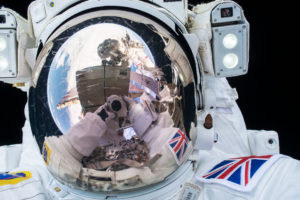Op-ed | UK-U.S. space cooperation soars to new heights
By Brian Berger

Throughout history, during challenging moments such as the one we face now, people have often found themselves casting their eyes up to the stars. Something about those pale white lights dotting the night sky has always been a source of reassurance and inspiration. The same is true for today.
Over the past few months, in the face of a pandemic, space agencies and businesses around the world have continued to inspire by stepping up to meet the challenge at hand. UK-subsidiary Virgin Orbit has developed a ventilator for COVID-19 patients. The UK government, in partnership with the European Space Agency, is funding the development of new space solutions to combat COVID-19. And just last month, NASA sent its first astronauts to space aboard the Crew Dragon spacecraft, as the world yet again looked to the stars above.
On June 16, after two years of negotiations, the United Kingdom and United States have signed their new “U.K.-U.S. Technology Safeguards Agreement,” which is sure to enable even more inspirational space endeavor on both sides of the Atlantic.
Because of this agreement, American space companies can launch rockets from British soil for the first time. It establishes critical safeguards for American companies to operate from UK spaceports and to safely export sensitive launch technology across the pond.
Today’s milestone is the latest in the UK’s efforts to become a real contender in the global space economy as well as a one-stop-shop for space companies. To achieve these aspirations, the UK is cultivating a strong and robust commercial space sector across its entire supply chain — from production to launch to postorbital services and applications.
For the production portion of the space equation, the UK is already a global hub for the manufacture of satellites, from small cubesats for use in low-earth constellations to 6 ton goliath satellites destined for geo-stationery orbit. In addition to satellites, nearly every commercial space component can be built in the UK, from spacecraft to launch vehicles to ground equipment, representing a $2.3 billion market in the UK.
After manufacturing equipment in the UK, companies will also soon be able to launch small satellites from British soil. To date, the UK Government has awarded $50 million to develop the UK’s spaceflight and launch capabilities. As part of this, $30 million has been awarded to American aerospace titan Lockheed Martin to establish vertical launch from the north of Scotland and to build an orbital maneuvering vehicle in Reading.
Horizontal launch capability is also being developed across the UK, with sites in England, Scotland, and Wales already developing their suborbital flight, satellite launch, and spaceplane ambitions. In November last year, a further $9 million was awarded as part of $35 million in government funding to support horizontal launch by Virgin Orbit from Cornwall Airport Newquay.
The UK is also a geographically strategic location for launch, with its long coastline and island location making it well suited to host different types of launch services. Scotland, with its high northern inclination, is an ideal location to reach polar, near-polar and low Earth orbits with vertically launched rockets.
After satellites are orbiting thousands of miles above our heads, space companies can operate these satellites efficiently and safely from the UK. The British satellite services sector is robust, with downstream applications representing 69% of the UK space industry. And with organizations such as the Satellite Applications Catapult, whose mission is to identify and exploit new satellite services markets, the UK is consistently looking to the horizon of satellite applications.
As a government, we are committed to enacting a modern and user-friendly regulatory environment for the commercial space sector, while working closely with industry to achieve the right balance of safety, environmental protection, sustainability, and support. The Space Industry Act, which received Royal Assent in 2018, is one of the most forward-thinking pieces of space industry regulation anywhere in the world, and the UK’s new National Space Council announced last year will provide strategic leadership on space across all of government.
Today’s announcement is more than just an agreement. It is an assurance to American space companies that their sensitive technologies will be protected in the UK. It is an opportunity for US industry to come and benefit from all the UK has to offer.
But most of all, it helps ensure space will continue to be a source of inspiration during the times we need it most.
Antony Phillipson is the United Kingdom’s trade commissioner for North America.
June 17, 2020 at 12:35PM
via SpaceNews.com read more...

Post a Comment